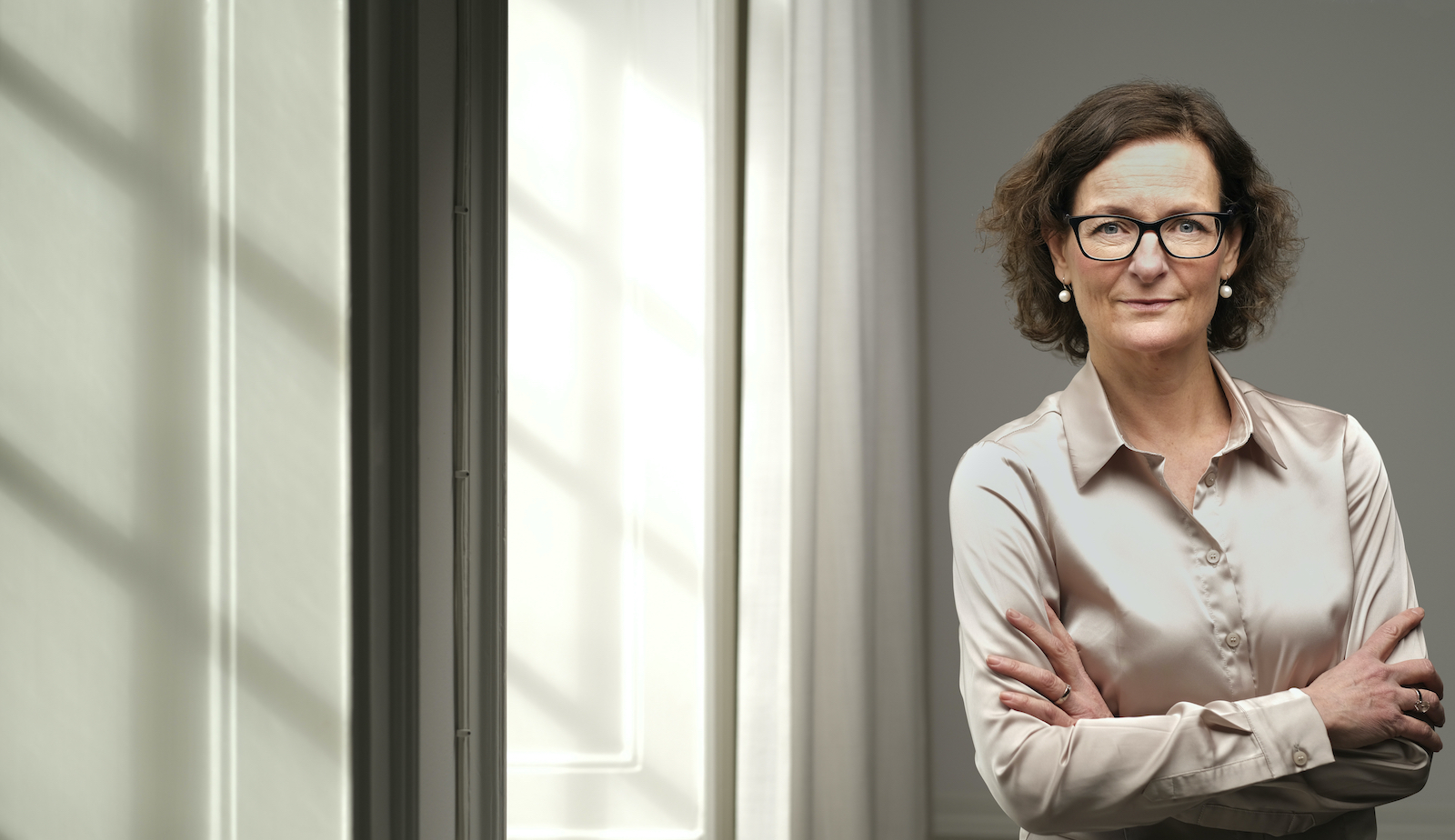Maria Fogelström Kylberg: ”Stockholm holds its own against the global competition”

Staf CEO Maria Fogelström Kylberg | Photo: Clément Morin
Since assuming the role of Staf’s CEO in 2013, Maria Fogelström Kylberg has led her organization through a complete transformation, bringing significant results. Despite downsizing, overall efficiency has improved, as has its international competitiveness. A growing number of students are now setting their sights on Stockholm and recent statistics show that the number of international students has increased by as much as 14 % over the last two years.
In the beginning of the fall semester 2018, Maria sat down with entrepreneur and writer Jenny Harler to discuss what challenges lie ahead and how attractive Stockholm really is as an academic destination. The following is an excerpt from their conversation.
Jenny Harler: As an organization, you represent 18 higher education institutions in Stockholm and that is all of them. Has it been difficult to agree on a common agenda?
Maria Fogelström Kylberg: No, I don’t think so. The schools are incredibly diverse and that might appear challenging, but when it comes to conveying the importance of academics in society, we all stand united. We are also aware that Sweden and Stockholm are relatively unknown to the rest of the world, which is why it makes sense to collaborate when it comes to positioning ourselves towards international students and researchers.
JH: Which schools have been the most successful in terms of positioning themselves abroad?
MFK: The large universities, such as Stockholm University (SU), Karolinska Institute (KI) and KTH Royal Institute of Technology (KTH), have all done a great job of making themselves visible towards international students. They attend fairs and collaborate with universities all over the world. Stockholm School of Economics is another great example of a school that has taken big steps towards internationalisation and come a long way.
JH: Their programs have also been highly ranked by the Financial Times.
MFK: Yes, that is right and that is, of course, impressive. KI is also ranked among the top medical universities in the world, while the Royal College of Music (KMH) is rated very highly in the performing arts category. We are also pleased to see that SU and KTH remain in the top 100 category.
”Earlier this year, Stockholm was ranked in joint fourth place with New York by Times Higher Education and that is because we are home to three of the world’s leading universities: KTH, SU and KI.”
JH: Is that also why we have seen that Stockholm, as a university city, has ranked so highly in the international index during the spring?
MFK: Yes, Stockholm holds its own against the global competition. Earlier this year, Stockholm was ranked in joint fourth place with New York by Times Higher Education and that is because we are home to three of the world’s leading universities: KTH, SU and KI. Rankings measure how many of the world’s 200 best universities congregate in the same city, and Stockholm and New York each have three.
“Cities like Amsterdam, Berlin and Munich are some of our biggest competitors, but in Stockholm, we are English-speaking to a much higher degree.”
JH: That is pretty amazing. And what do the students say about Stockholm?
MFK: We are in contact with many of our international students and they are very pleased. This year, Stockholm also went up 60 spots in the QS Best Student Cities ranking, compared to 2017. One comment that we received was that they appreciate the tolerant and progressive ideology that Swedes demonstrate in Stockholm. Our own annual student surveys also show that students associate Stockholm with concepts such as sustainability, equality, innovation, and creativity.
JH: How does Stockholm compare to other cities? I know that you have studied in both Stockholm and Paris.
MFK: Yes, I attended a private university in Paris right after my high school graduation. It was in the late 1980s and at the time, it was rather difficult to study abroad as a foreign student but thanks to Sweden’s membership in the EU, there are now amazing opportunities. But, of course, Paris is really a magical city for young people, and like Stockholm, in a league of its own.
“Language is definitely the key to fully understanding another culture.”
JH: If you are studying in Paris it also helps that you are fluent in French, which I am not (laughs).
MFK: Oh, you can be. You just have to live there for a year or two. But I will admit that I studied French for 12 years before I felt like I mastered it and I did that because I love everything about the language. I also lived in Paris for three years and in Brussels for another eleven, and these days French is actually my second language before English.
JH: And I understand that you get your news in French every day?
MFK: Yes, that is true. I only read books and newspapers in French to keep the language alive. Language is definitely the key to fully understanding another culture.
JH: I can only agree and in certain countries it can be really difficult to get by without fully grasping the local language. At the same time, I understand that many international students in Stockholm feel that they can manage with English alone.
MFK: Yes, that is absolutely true and that is a big advantage. Cities like Amsterdam, Berlin and Munich are some of our biggest competitors, but in Stockholm, we are English-speaking to a much higher degree. We have also cultivated a more innovative environment, which is important to many students.
”We know that big countries like China and India are constantly improving and enhancing their universities, which make them more competitive.”
JH: Meanwhile, the competition for international students has increased on a global level and this year China attracted close to half a million international students. Countries such as South Korea, Malaysia, and Singapore have also emerged as popular study destinations. What can we learn from them?
MFK: We know that big countries like China and India are constantly improving and enhancing their universities, which make them more competitive. Subsequently, we can assume that students from those countries won’t be as interested in traveling abroad to study in the future. Stockholm’s largest universities have already developed long-term partnerships with universities in Southeast and East Asia and those have run for many years but it is, of course, vital that we continue to maintain and deepen those relationships.
JH: The language must also be of great importance. How many courses does Stockholm’s universities offer in languages other than Swedish today?
MFK: Oh, that is a difficult question. I can’t answer that. I would say that the majority of the master programs are offered in English only. In addition to that, the universities offer more and more classes in English every year and similar efforts are being made by the smaller schools.
JH: And as a result, almost 10 % of Stockholm’s student body is made up of foreign students?
MFK: Yes, that is correct and we are thrilled about that.
JH: From what I understand, the largest group of international students come from Germany.
MFK: Yes, that’s right. More than 700 German students are currently studying in Stockholm.
JH: Which other nationalities top your list of incoming students?
MFK: Among the top 10, we see countries such as Finland, France, China, India, Spain, and Italy.
”We also need to see closer cooperation between corporations and universities in order to provide international students with interesting jobs and make sure that they can stay in Stockholm for a few years after graduating.”
JH: How do you think that things will progress? Can we expect a surge in international students among any other nationalities and if so, which ones?
MFK: I believe that the overall number will continue to rise. The programs that we offer are of high quality and Stockholm is increasingly known as an academic destination. The number of Indian students has already gone up by 22 % since the last academic year and the Chinese students now make up our largest group of international students outside the EU. I would also like to believe that the strategic work that we are involved in has enhanced the positioning of Stockholm as a strong, academic destination.
JH: If your resources were unlimited and you could make any changes, in order to make Stockholm an even better university city, what would you do?
MFK: More student accommodation is a definite answer. We also need to see closer cooperation between corporations and universities in order to provide international students with interesting jobs and make sure that they can stay in Stockholm for a few years after graduating. Better student discounts is another important issue for international students who tend to find Stockholm expensive.
”Many students want to be photographed in the Blue Hall and next to the golden Nobel plaque. It is clear that Nobel holds a great deal of value globally.”
JH: You work with researchers and I know that you have just entered an exciting partnership with Nobel Center. What can you tell us about that?
MFK: Yess! We are launching Stockholm Explorative Talks with Nobel Center during the official week of the Nobel Prize announcements, also known as “Nobel Calling”. It is a really exciting event as it involves academics of various disciplines. The main idea is to challenge researchers to meet in new, creative ways.
JH: And how important is the Nobel Prize for Stockholm as a university city?
MFK: International students often tell us that the Nobel Prize is a big deal and well known the world over and that is, of course, a factor that contributes to the attractiveness of Stockholm as a student city. When we arrange our annual student reception at Stockholm City Hall, we have also noticed that many students want to be photographed in the Blue Hall and next to the golden Nobel plaque. It is clear that Nobel holds a great deal of value globally.
”I wish that everyone understood that academics are of vital importance to the advancement of society. ”
JH: It is so easy to underestimate the city that you live in. What would you like Stockholmers to know about their city from an academic perspective?
MFK: I wish that everyone understood that academics are of vital importance to the advancement of society. If Sweden didn’t have such a strong academic tradition, we wouldn’t be as well off as we are today. In addition to that, few people know that Stockholm alone is home to 18 independent higher education institutions. The diversity that they represent is unique. The oldest school, the Royal College of Music (KMH), was founded in 1771, and the youngest, Stockholm University of the Arts, started in 2014. In the performing arts category, KMH was ranked number 6 in the world last year and that is a grand achievement. That said, Sweden is, of course, a global player in this field and the music industry continues to grow. We have much to be proud of.

